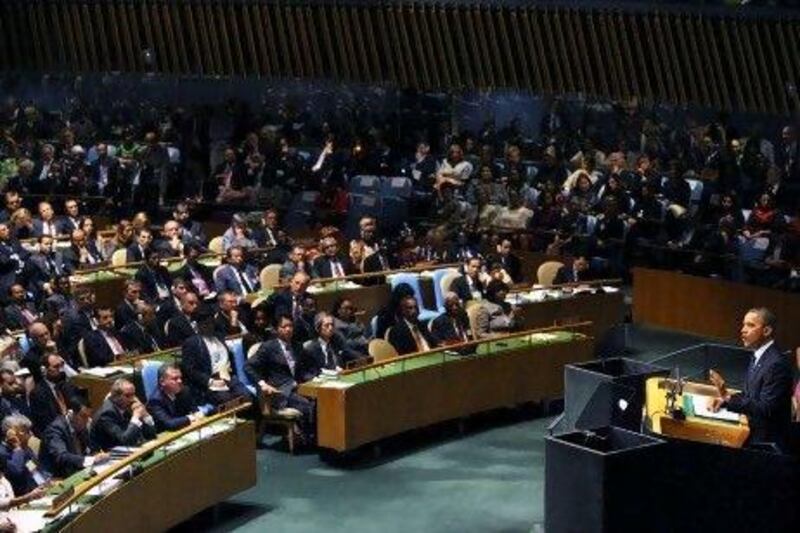UNITED NATIONS // In his last UN address before Americans decide whether to re-elect him in November, Barack Obama, the US president, yesterday defended Americans' belief in freedom of speech while condemning the denigration of Islam, and he held out the threat of military action to keep Iran from obtaining a nuclear bomb.
Mr Obama devoted most of his 30-minute speech to the Middle East and addressed the politically sensitive US response to the region's upheavals, intended as much for the audience of world leaders in the room as for voters at home.
He defended his handling of the Arab uprisings against sharp criticism by his Republican Party challenger, Mitt Romney, who has charged that Mr Obama is a captive, rather than shaper, of events in the region.
"We insisted on change in Egypt, because our support for democracy put us on the side of the people," Mr Obama said. "We supported a transition of leadership in Yemen, because the interests of the people were not being served by a corrupt status quo."
The president said the US intervened militarily in Libya with UN backing "because we had the ability to stop the slaughter of innocents" and to back "aspirations of the people [that] were more powerful than a tyrant".
Mr Obama said such a fate was also deserved by the president of Syria. "We again declare that the regime of Bashar Al Assad must come to an end so that the suffering of the Syrian people can stop, and a new dawn can begin."
"Today, we must affirm that our future will be determined by people like Chris Stevens, and not by his killers," Mr Obama said, referring to the death of the US ambassador in Libya two weeks ago. "Today, we must declare that this violence and intolerance has no place among our United Nations."
The president attempted to juggle what many in the region might consider contradictory positions: defending the right of an amateur filmmaker to make a video portraying the Prophet Mohammed in an unflattering manner, while at the same time condemning the denigration of Islam.
The video set off at least the initial protests in Benghazi, and demonstrations later throughout the Islamic world, leaving as many as 50 people dead.
Mr Obama called it a "a crude and disgusting video" that the US government had nothing to do with. "I believe its message must be rejected by all who respect our common humanity,"he said.
Mr Obama said the film was an insult not only to Islam but to America. "We not only respect the freedom of religion - we have laws that protect individuals from being harmed because of how they look or what they believe," he said.
But he said the United States was unable to ban such videos because of a constitution that protects free speech.
"Here in the United States, countless publications provoke offence," he said. "Like me, the majority of Americans are Christian, and yet we do not ban blasphemy against our most sacred beliefs."
He said that while not all nations "share this understanding of the protection of free speech", the notion that the flow of information could be controlled was "obsolete" because of today's technology.
Mr Obama asked for universal condemnation of attacks on all religions. "The future must not belong to those who slander the Prophet of Islam," Mr Obama said. "Yet to be credible, those who condemn that slander must also condemn the hate we see when the image of Jesus Christ is desecrated, churches are destroyed, or the Holocaust is denied."
The remark about denying the holocaust appeared intended for Iran's president, Mahmoud Ahmadinejad, who on Monday questioned why researchers questioning this "historical issue" were jailed in the West if it believes in free speech.
Mr Obama said that Iran shows "where the path of a violent and unaccountable ideology leads". While praising Iran's ancient culture, he blasted Tehran for "propping up a dictator in Damascus" and supporting terrorism abroad.
The US president did not draw the "red-lines" on Iran's nuclear programme demanded of him by Israeli prime minister Benjamin Netanyahu. But he also did not remove the threat of a US strike on Iran.
"Let me be clear: America wants to resolve this issue through diplomacy, and we believe that there is still time and space," Mr Obama said. But he added that a "nuclear-armed Iran is not a challenge that can be contained".
He said it would threaten the elimination of Israel, the security of the Gulf, and the stability of the global economy. "It risks triggering a nuclear-arms race in the region, and the unravelling of the non-proliferation treaty," he said.
"And that is why the United States will do what we must to prevent Iran from obtaining a nuclear weapon," he said.
foreign.desk@thenational.ae






